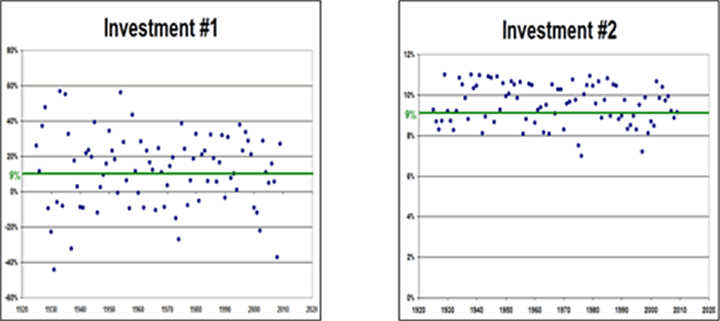How to Cut the Risk in Your Stocks Portfolio
/ Risk Analysis Aug 01, 2010 - 08:17 AM GMTBy: Bryan_Rich
 I normally talk only about currencies in my Money and Markets columns. But today I want to make an exception and address some commonly held misconceptions many investors have about their investments.
I normally talk only about currencies in my Money and Markets columns. But today I want to make an exception and address some commonly held misconceptions many investors have about their investments.
For the typical individual investor it’s easy to get caught up in the 24-hour a day media hype of the stock market. So it’s no surprise that many live and die with the direction of the market. They’ve bought hook-line-and-sinker into the notion that blindly plowing money into stocks is the only way to grow their wealth.
And given the whiplash investors have experienced in recent years and the uncertain outlook for the global economy and financial markets, they’re feeling anxious and asking:
- With stocks 42 percent off their 2007 highs, is this the time to be piling in? Or …
- With stocks 66 percent above the 2009 lows is now the opportunity to sell before another storm hits?
|
Certainly valid questions …
But here is what’s even more important: Realizing there are a lot of false expectations of what the stock market index offers and misconceptions on its past returns.
Investors often fail to understand that …
It’s All about Risk
Inexperienced investors think they should be able to buy at bottoms, sell at tops and make gobs of money — an extremely difficult task.
Especially when you consider that the long-run annualized return for the S&P 500 (including dividends) is 9 percent. And after fees, most professional mutual fund managers do not beat the S&P 500.
Moreover, too many investors do not understand the risk they’re asked to take to achieve a 9 percent return.
The volatility of stock market returns is best measured by looking at the dispersion of returns around the average return. This is called the standard deviation and gives you a clue as to how much risk you have to endure to achieve your expected return.
For example, the standard deviation of the S&P 500 is 19 percent.
That means the S&P 500 should trade plus or minus 19 percent around its long-term average return roughly 70 percent of the time. So if you use standard deviation as a gauge of risk, you’ll find that the broad stock market pays you only 1 unit of return for 2 units of risk taken.
Look at the two hypothetical charts below …

Both investments have a 9 percent average annual return. But Investment #1 has a wide range of returns, while Investment #2 has a stream of returns that more tightly hug the average annual return.
If each of the points on the charts represents an annual return and both investments achieve the same end result, which investment should you choose?
The answer: Investment #2 — the one with the tighter distribution of returns since it gives you a higher probability of achieving a higher return.
Here’s why: Your investment’s performance will largely depend on when you enter and when you exit. If you enter or exit at any given point along the path of Investment #2, the likelihood of success is greater than it would have been with Investment #1.
So unless you think you can pick the exact bottom to enter and the exact top to exit, you’re far better off finding investments that have a tighter distribution of returns.
The bottom line is, a buy and hold strategy in the broader stock market index just doesn’t compensate you for risk. That’s why it’s important to find more sophisticated strategies using a wide range of investment options (including stocks, bonds, currencies, and commodities) that target positive returns and offer diversification to your portfolio.
|
The Goal: Positive Risk-Adjusted Returns
Whenever the stock market has a down year, most mutual fund managers start talking in terms of relative returns. You might see a manager’s monthly letter tout how well they did relative to the S&P 500. For example, they may be down 35 percent when the S&P 500 was down 38 percent. That’s a win in their eyes! And the manager gets a bonus.
But as ridiculous as that sounds, the same can be said for the other side of the coin … when stocks are rising, relative returns are equally as meaningless.
Alternatively, you should keep a constant focus on achieving positive annual returns, year-in and year-out. And those returns should fairly compensate you for the risk you’re taking. By that, I mean you should expect to achieve greater than one unit of return for each unit of risk taken — a positive return that’s adjusted for risk.
This investment strategy will give you a better chance of growing your money during your specific holding period.
Therefore, you should consider …
Currencies As an Alternative Asset Class
In addition to stocks, currency investments are a great way to add risk-adjusted returns that are uncorrelated to the other assets in your portfolio — a prudent method for achieving profit and protection against downside risk.
What’s more … there’s always a bull market in currencies. When one currency falls, it always means another currency rises. So no matter what’s happening in stocks, bonds, commodities or real estate, you can profit!
Regards,
Bryan
P.S. I’ve been showing my World Currency Alert subscribers how easy it is to use exchange traded funds to diversify their portfolios and manage their risk in both good times and bad. Click here to learn more.
This investment news is brought to you by Money and Markets. Money and Markets is a free daily investment newsletter from Martin D. Weiss and Weiss Research analysts offering the latest investing news and financial insights for the stock market, including tips and advice on investing in gold, energy and oil. Dr. Weiss is a leader in the fields of investing, interest rates, financial safety and economic forecasting. To view archives or subscribe, visit http://www.moneyandmarkets.com.
© 2005-2022 http://www.MarketOracle.co.uk - The Market Oracle is a FREE Daily Financial Markets Analysis & Forecasting online publication.





